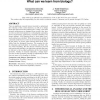238 search results - page 40 / 48 » On the Modularity of Theories |
CCR
2010
13 years 7 months ago
2010
There is significant research interest recently to understand the evolution of the current Internet, as well as to design clean-slate Future Internet architectures. Clearly, even ...
CORR
2006
Springer
13 years 7 months ago
2006
Springer
Once the set of finite graphs is equipped with an algebra structure (arising from the definition of operations that generalize the concatenation of words), one can define the noti...
JBI
2006
13 years 7 months ago
2006
Domain reference ontologies represent knowledge about a particular part of the world in a way that is independent from specific objectives, through a theory of the domain. An exam...
NJC
2006
13 years 7 months ago
2006
Abstract. General purpose theorem provers provide advanced facilities for proving properties about specifications, and may therefore be a valuable tool in formal program developmen...
IJAR
2007
13 years 7 months ago
2007
In order to handle inconsistent knowledge bases in a reasonable way, one needs a logic which allows nontrivial inconsistent theories. Logics of this sort are called paraconsistent...

